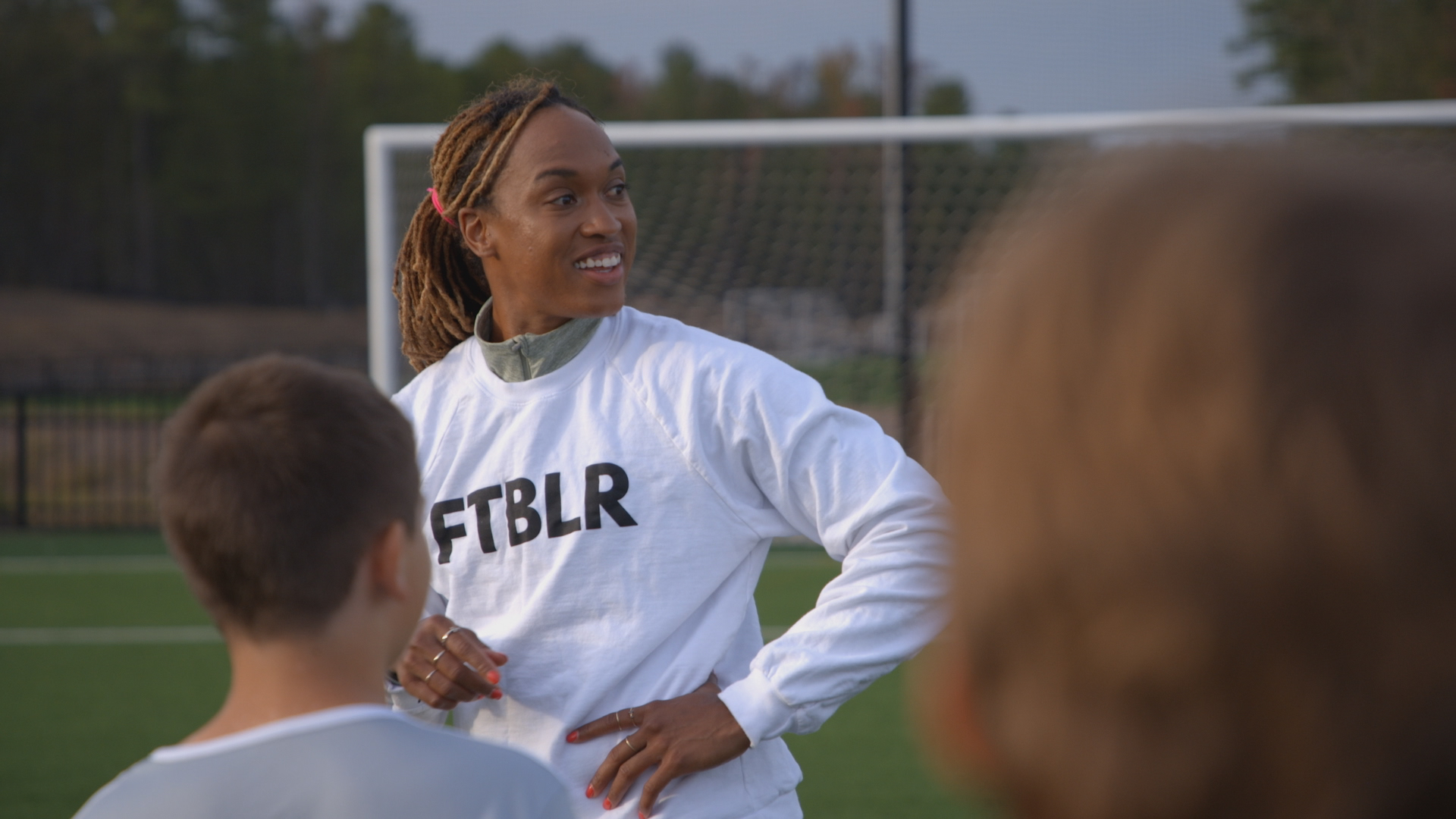
Sometimes a sports documentary isn’t just for athletic enthusiasts. HBOMax original LFG is one such film, explicitly about soccer players, their hard work, challenges, and triumphs. It is also plainly political, structured not around a particular match but around the U.S. Women’s National Team’s lawsuit against their employer.
The film follows six soccer stars and lead counsel Jeffrey Kessler and his legal team after they filed a gender discrimination complaint alleging that the pay discrepancy between the U.S. Women’s and Men’s Soccer teams is illegal.
If you are looking to better understand the legal argument for the athletes’ case, this is not the film for you. If you want to understand how the U.S. Soccer Federation came to pay and treat its male and female athletes so differently, this is also not the place to get your facts. But if you want an inside look at what it feels like to fight against your employer to correct a disparity, LFG fits the bill nicely.
(For background on the ins and outs of the dispute, read ESPN’s explainer or PolitiFact’s deep dive into the issues.)
Many superfans will tell you that following fútbol isn’t just about love for the beautiful game, and much of the attention garnered by the World Cup-winning team is a great example of that. The six players who participated in the documentary, most of whom will also be Olympians this month, embody sportsmanship and inspiration on the field and in the film.
LFG has been greeted with enthusiasm since its Tribeca Film Festival debut. But it also has garnered its fair share of criticism from those who wanted it to be a different, more objective project.
LFG’s Scope and Mission
Oscar-winning directors Sean Fine and Andrea Nix Fine set out to make a documentary from the perspective of the players.
Despite that, Nix Fine told NPR’s Alisa Chang that they “did approach [the U.S. Soccer Federation], and we gave them ample time to participate. That was their decision, and they declined. And we felt it was unfortunate.”
In addition to the declined on-camera appearance, Nix Fine says her team had “conversations with them off-camera to make sure we understood their position on the equal pay dispute. And we spent two years researching court records and public documents and [collective bargaining] agreements.”
LISTEN FOR MORE: Filmmaker Nix Fine on controversy surrounding soccer documentary (NPR)
The multi-year project kicked off soon after the International Women’s Day announcement that the team would sue U.S. Soccer for gender-based discrimination.
Amy Kaufman writes for the LA Times, “Andrea Nix Fine and Sean Fine noticed the groundswell of public support for the women, but also observed how many were misunderstanding the complicated legal situation. Their hope was to tell the story of the equal pay fight from the inside, embedding with the team to document what it’s like to be a professional athlete who is suing the organization she works for.”
Kaufman reports that they first reached out to Rapinoe, who was known for taking vocal stances and being media-friendly long before the lawsuit. The Fines won her over by explaining that they did not want to glamourize the team’s struggles.
Rapinoe told the LA Times, “I liked the idea of pulling back the curtain and detailing how much work and energy it requires to go through this fight — that was kind of the selling point for me.”

Once they cleared that initial hurdle, they also had to convince other teammates. Five others signed up for the venture: Jessica McDonald, Sam Mewis, Kelley O’Hara, Christen Press, and Becky Sauerbrunn. The USWNT’s legal reps also had to vet the project and chose to participate on- and off-camera. U.S. Soccer did not, which meant more than losing out on a few interviews; the Fines could not film at practices or games because of this decision.
The project’s direction was also challenged by the COVID-19 pandemic. Each participating player was sent her own camera to ensure emotionally salient moments were safely captured.
Sean Fine told the LA Times, “I was really uncomfortable with that at first, because I’m the cinematographer on all of our projects, and they’ve got a lawsuit, COVID, training to stay in shape and then, ‘Hey, here’s a camera, please figure out how to shoot something with the best lighting and upload the footage to us on a secure server.’ It was a big ask, and we’d just get, like, a thumbs-up emoji back on text and had to hope it would all work out.”
READ MORE: Megan Rapinoe on the fight for pay equality (Los Angeles Times)
Some critics have observed that LFG is far from objective in its exploration of the issues surrounding the legal fight. But there were market realities that influenced some of the decisions that Change Content – the Fines’ production company – made when creating, positioning, and editing the film.
LFG editor Jeff Consiglio told Jourdan Aldredge of Premium Beat, “Documentary filmmaking is wildly robust right now. There are more documentary films made every year than ever before. Part of the reality of that is that each film has to win the attention of the audience—or, initially, the gatekeepers to that audience who are studios, distributors, festival programmers, etc.—and so, our films are becoming louder and more audacious as a result.”
NOT WHODUNNIT, BUT HOW-DUNNIT — DIGGING INTO DOCUMENTARIES:
Documentary filmmakers are unleashing cutting-edge technologies such as artificial intelligence and virtual reality to bring their projects to life. Gain insights into the making of these groundbreaking projects with these articles extracted from the NAB Amplify archives:
- Crossing the Line: How the “Roadrunner” Documentary Created an Ethics Firestorm
- I’ll Be Your Mirror: Reflection and Refraction in “The Velvet Underground”
- “Navalny:” When Your Documentary Ends Up As a Spy Thriller
- Restored and Reborn: “Summer of Soul (…Or, When the Revolution Could Not Be Televised)”
- It WAS a Long and Winding Road: Producing Peter Jackson’s Epic Documentary “The Beatles: Get Back”
The end product features “very bold storytelling” characteristic of modern docudramas, despite or even because of its reliance on a variety of footage types, according to Consiglio. He admits this approach “also can invite shock at the expense of integrity.”
Consiglio predicts that “the survival of the genre will depend entirely upon our ability to maintain the kind of depth and integrity of storytelling that requires patience and persistence. It’s possible for fast and patient, surface and depth, audacity and integrity to all co-exist, it just remains to be seen if it will.”
Due to the constraints imposed by COVID-19, Consiglio also had to find a different workflow for his fourth project with the Fines. He stuck with NLE Premiere Pro, but added in EverCast for real-time video and audio playback. Consiglio told Aldredge EverCast is essentially “Zoom on steroids.”
READ MORE: Jeff Consiglio talks creating the right modern “docudrama” style for LFG (Premium Beat)
Reviews and Reactions
The end result of all this hard work and pivoting is, according to Decider’s Lea Palmieri, a documentary “not just for sports fans and not just for women, but for all people. Come for the soccer but stay for the ridiculous, discriminatory issue that is unfortunately way, way too pervasive in our society.”

She writes that “LFG is everything a documentary should be: there’s a clear story and fight at hand, the subjects are charismatic and prepared (and again, so, so cool), and there is a blatant lesson to be learned. The film is super entertaining as it uses staggering statistics to make its point, but also painfully vulnerable as these women let us into their hearts and lives off the field.”
READ MORE: LFG’s expansive and infuriating appeal, according to Lea Palmieri (Decider)
Backlash and Criticism for LFG
However, according to reporting from the Washington Post and Goal.com, USA Soccer sees it all differently.
“The approach taken by the filmmakers made us feel there wasn’t a sincere desire to fairly include information from the federation,” USSF Spokesman Neil Buethe told the Post’s Steven Goff. Specifically, they said the lack of information and timing late in production made them wary.
Former USSF President Carlos Cordeiro was separately invited to participate and separately declined, according to the Post.
Because of this, LFG “is strictly from the perspective of the players and their legal team, a behind-the-scenes peek at a gender discrimination lawsuit filed in the buildup to the 2019 World Cup and one that continues today,” Groff notes.
A common (and valid) criticism of the film is that LFG does not address the role played by Federation Internationale de Football Association.

Groff writes, “FIFA is in the background of this struggle. Soccer’s international governing body rewarded France $38 million for capturing the 2018 men’s title. A year later, the United States received $4 million for claiming the women’s championship. In rewarding its players, the USSF says its hands are tied because of the paltry FIFA payout.”
Groff concludes, “The filmmakers should be commended for telling an important story. Unfortunately, it’s missing a few chapters.”
READ MORE: LFG is missing important parts of the USWNT’s inequality story (Washington Post)
Seth Vertelney of Goal.com writes that “U.S. Soccer laid out their argument in a 17-tweet thread on Twitter, saying… ‘there is a concerning level of dishonesty about U.S. Soccer and the USWNT’s compensation that we feel must be addressed.’” The federation points directly at “lawyer Jeffrey Kessler” who they say presents a misleading and inaccurate account of the facts” (and who conveniently is neither a beloved national sports figure nor their employee).
READ MORE: United States Soccer Federation defends itself against lawsuit, documentary’s allegations (Goal.com)
The Wall Street Journal’s John Anderson believes that this lack of objectivity is a serious flaw. Anderson writes, “The team’s popularity will probably allow HBO Max to get away with calling ‘LFG’ a documentary instead of what it is—a shiny infomercial for the players and their 2019 pay-equity lawsuit against the U.S. Soccer Federation. The issues in the film add up to a rat’s nest of athletic, economic and gender questions. But they’re given only superficial scrutiny in a production that’s essentially propaganda, powered by pumped-up music and pumped-up players.”
READ MORE: John Anderson issues “fairness” red card to LFG (Wall Street Journal)
LFG is nonetheless a compelling watch, but one that may have benefited from fewer lawyers and gimmicky graphics. Still, it’s hard to sit through the film and not conclude that these incredible athletes and activists have a bigger goal than winning at heart. Maybe the Fines do, too.



